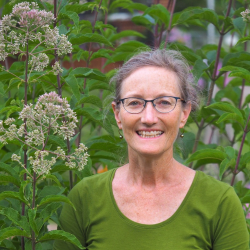Nancy Lee Adamson from Xerces Society joins the FAP team today
Published on: March 29, 2021, Submitted by Laura Becker on: March 29, 2021
Today, I join ICARDA to support the Conservation of Pollinator Diversity for Enhanced Climate Change Resilience project. Since 2011, I have been working with the Xerces Society for Invertebrate Conservation (Xerces) and the U.S. Department of Agriculture (USDA) Natural Resources Conservation Service (NRCS) supporting pollinator and other agriculturally beneficial insect conservation as senior pollinator conservation specialist for the southeastern U.S. At ICARDA, using the Farming with Alternative Pollinators (FAP) approach, I will work on pollinator related ecotourism, protection of ground-nesting pollinators, and provide support for national strategies and action plans for pollinator protection.
Dr. Nancy Lee Adamson
Xerces is a science-based international nonprofit organization founded in 1971 dedicated to the conservation of invertebrates and their habitats. Since 2006, Xerces has partnered with the USDA NRCS to support pollinator conservation using Farm Bill Programs. While a large part of Xerces programming focuses on protection of native plant communities to support invertebrates, much of their farmland work parallels the FAP approach, helping farmers manage their farms to improve biodiversity for better farm production.
A key strategy for mitigating potential loss of pollinators is enhancing floral diversity on farms. Adding crops and other flowering plants that expand the kinds and length of bloom, adding structural diversity to provide diverse habitat niches, and reducing or eliminating pesticide use helps support more kinds of pollinators and natural enemies of crop pests such as wasps, flies, and beetles. Greater diversity of pollinators and other arthropods (insects, spiders, etc.) helps ensure that if any one species is lost, others will be able to compensate. In addition, using cover crops or strips of annual herbs can reduce pesticide use, reduce soil and pesticide run-off, reduce soil temperatures, and protect watershed health. Just as in Morocco, many of the farmers in the southeastern U.S. grow cereals that do not require pollination, but on-farm biodiversity helps reduce pest pressure and improve production.
With Xerces and NRCS’ East National Support Technology Center (ENTSC), I provided technical support to NRCS staff, partners, farmers, and community groups. I promoted enhancing diversity on farms, in gardens, and other landscapes to support pollinators and other wildlife, manage crop pests with conservation biocontrol, reduce pesticide use, and protect watershed health. I provided trainings on habitat assessment and enhancing diversity through perennial and annual plantings, and farm management practices. I installed a demonstration hedgerow on the organic unit of the research farm at North Carolina Agricultural and Technical State University (NC A&T). I also wrote or co-wrote technical guidance, such as regional plant lists and conservation planning materials. Most recently, I presented a webinar for Bee City USA focused on specialist bees to encourage affiliates to help document diversity using iNaturalist and other community science projects.
Before joining Xerces and NRCS, I studied native bees important for crop pollination for my doctoral research in entomology at Virginia Tech. I also worked with the University of Maryland Extension, at Adkins Arboretum (a native plant arboretum), and with the New Jersey Natural Heritage Program, all with an emphasis on habitat protection and restoration.
I am especially happy to be joining ICARDA in Rabat, Morocco, because I earlier worked in North Africa as a U.S. Peace Corps volunteer in Tunisia. That experience opened my eyes to habitat degradation and led to a career focused on ecological restoration.
Acknowledgement
Federal German Ministry for the Environment, Nature Conservation and Nuclear Safety





